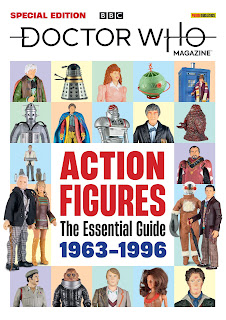Here’s a thing that might be of interest. When I was asked to write an ‘afterword’ for the DWM Special Edition guide to action figures, I initially misunderstand the nature of the brief. I thought it was gonna be a guide to collecting toys from the 60s and 70s, so I started writing an article on that basis. Then, just before I was about to write the introductory part (I am so non-linear, I just start at any point I can!) I re-read the brief and realized everything I had written was completely useless. So I had to start from scratch. But here, because I think it contained some rather neat observations, is the article I never finished, let alone sent in:
In Search Of Lost Time
INTRODUCTION TO GO HERE
One explanation is the desire to reconnect with childhood, and have the feeling of an involuntary memory being triggered. The ‘Proustian rush’ from a toy is different to that from a television programme or comic; the sensation of actually touching and smelling the object is a physical memory, rather than purely a mental one. There is something quite strange about handling a toy as an adult that you played with as a child; large, clumsy fingers holding an object once held by the same fingers when they were small and nimble. And it brings back memories of play; maybe a more innocent time, certainly a time of happiness, of being content within an imaginative bubble. And, as an adult, those memories become ever-more precious, so whether it’s through the same treasured toy, recovered from an attic, or a replacement for one that was damaged, lost, or cruelly thrown away, the motivation is the same; the desire to recapture, however slightly and briefly, a fragment of the past.
But you don’t need to have owned the toy to feel nostalgia. It could be because it is ‘unfinished business’. The desperate longing for the toy you didn’t own; the one you only saw in shop windows and catalogues and advertisements, can still be with you as an adult, so when you see that toy again, on an internet auction site or a dealer’s stall, buy it and finally hold it in your hands, there is a strong feeling of ‘at last!’ The sense that by fulfilling that longing, you are somehow making good a source of childhood unhappiness or frustration.
Paradoxically, you don’t even need to have been around at the time the toy was on sale to feel nostalgia for it. People can feel nostalgic for eras before they were born; maybe because of the aesthetics, or the idea of a more innocent age, or just because the past is a known quantity; it’s like a story where you know how it ends, it’s a safe space that isn’t going to change. The past is like a foreign country; probably nicer in your imagination than the reality.
And Doctor Who fans, in particular, are used to this form of time-travel, as for most of us, part of the fascination of Doctor Who is that it has a past. A past that we can visit, by watching old stories on DVD, casting ourselves back to life in the 60s, 70s or 80s. And collecting toys from those days is just taking the same process further; they give you the chance to touch the past.
But enough of the pop psychology. There’s also the fact that a lot of these old action figures have a lot of charm. They are just really cool to own.
